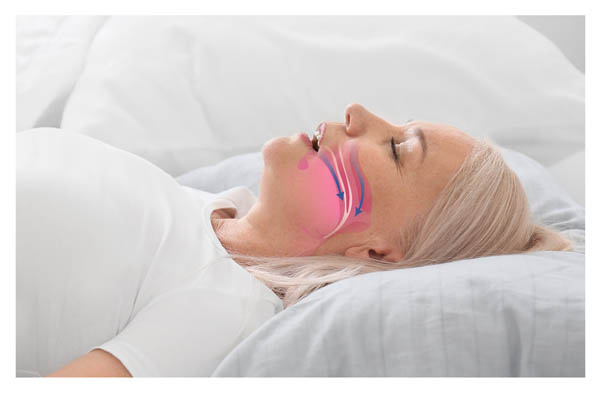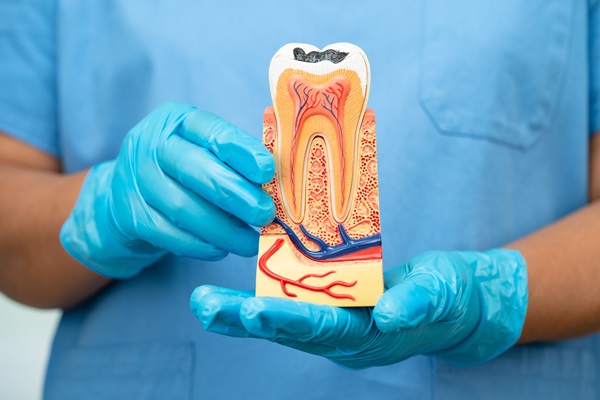Questions and Answers about How a General Dentist Can Help with Sleep Apnea

Sleep apnea and dentistry have a lot of crossover that many are surprised to hear. The oral cavity is often what causes sleep apnea, which makes a dentist an expert at detecting, diagnosing and treating this common condition. Without treatment, patients are at risk of loss of oxygen and long-term damage to the oral cavity. Because of this risk, it is highly recommended to visit a medical professional for help. More often than not, patients are advised to see a general dentist. Keep reading to find out more!
A dentist's role in sleep apnea
Outlined below are a few questions and answers about the role a dentist plays in sleep apnea treatment. It can be helpful to review this information when looking into different treatment options.
1. Can a dentist treat sleep apnea?
Yes! A dentist can actually detect, diagnose and treat sleep apnea.
2. How does treatment work?
Sleep apnea treatment from a dentist typically involves one of two oral appliances, with the first being a mandibular advancement device and the second being a tongue retaining device. In some scenarios, the dentist may also recommend a CPAP machine; however, the assistance of a doctor may also be needed.
A mandibular advancement device is similar to a mouthguard. It snaps over the top and bottom arch of teeth and has metal hinges that encourage the jaw to be held in a forward position. A tongue retaining device, on the other hand, holds the tongue forward to keep it from obstructing the airway.
3. How does a dentist detect sleep apnea?
A dentist detects sleep apnea in patients by examining the oral cavity. There are a few warning signs that can be checked for during a routine appointment.
- A scalloped tongue that appears wavy or ridged
- Weakened teeth that have resulted from bruxism
- Shrunken or small jaw
- A red or inflamed throat
4. Is sleep apnea curable?
Yes and no. Most dentists are not able to find a cure for sleep apnea; however, treatment can produce positive results, thus making symptoms manageable. Over time, with treatment, the symptoms of sleep apnea may be reduced, if not completely eliminated.
5. When is it necessary to see the dentist for sleep apnea?
A dentist can be extremely helpful for sleep apnea treatment and management. They undergo extensive training on the oral cavity, which makes them experts at helping to keep the airway unobstructed. Their treatment approach is often easier on the patient, as oral appliances do not require tubes and machines like CPAP treatment does.
Find out more from a general dentist
Sleep apnea can be very dangerous if treatment is not provided. Working with a dentist is the best place to start. An evaluation can be done in order to identify the appropriate course of action. Additionally, questions and concerns can be addressed, which can be helpful for the patient who may feel anxious or afraid. Reach out today to learn more about treatment or to get scheduled for an appointment.
Request an appointment here: https://beautifulmouth.com or call Beautiful Smile, LLC at (856) 346-8900 for an appointment in our Gibbsboro office.
Check out what others are saying about our dental services on Yelp: Sleep Apnea in Gibbsboro, NJ.
Recent Posts
Sleep apnea is a medical condition that a lot of people suffer from. Dental specialists that focus on dental sleep medicine are able to manage and treat sleep apnea through a variety of different methods. Each method is customized to fit the patient’s needs, but some of the most popular methods include the use of…
Dental sleep medicine can help with snoring and obstructive sleep apnea, which are two common sleep problems. Snoring is one of the primary symptoms of obstructive sleep apnea, but not everyone who snores has it. However, snoring alone can cause problems for individuals and their sleep partners by interrupting sleep. While the Continuous Positive Airway…
A preventative dentistry question people commonly have is, "what stains teeth the most?" We will look at some of the foods and beverages that are teeth staining to help you avoid these and keep a white smile longer. There are lots of different foods that can stain teeth. Some are well known and obvious. Blueberries, for…
Dentists recommend root canal treatment for damaged, diseased, or infected teeth. The treatment aims to eliminate bacteria within the tooth's pulp and save a patient's natural teeth. After a tooth matures, it no longer requires the pulp for nourishment. The dentist removes the infected pulp, disinfects the inside, and seals it to prevent reinfection.Decay and…


